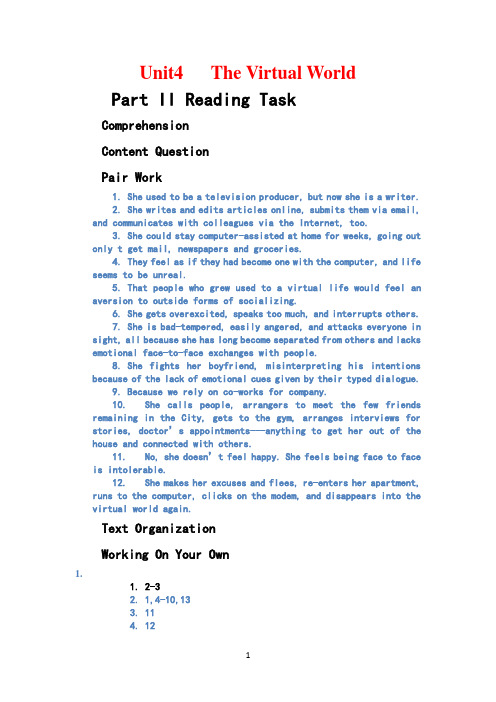3. A Virtual Life
- 格式:ppt
- 大小:3.96 MB
- 文档页数:19

Unit1 A Learning, Chinese-StyleUnit2 A A Life Full of RichesUnit3 A Father Knows BetterUnit4 A A Virtual LifeUnit5 A True HeightUnit6 A A Woman Can Learn Anything a Man CanUnit1Howard Gardner, a professor of education at Harvard University, reflects on a visit to China and gives his thoughts on different approaches to learning in China and the West.哈佛大学教育学教授霍华德·加德纳回忆其中国之行,阐述他对中西方不同的学习方式的看法。
Learning, Chinese-StyleHoward Gardner 1 For a month in the spring of 1987, my wife Ellen and I lived in the bustling eastern Chinese city of Nanjing with our 18-month-old son Benjamin while studying arts education in Chinese kindergartens and elementary schools. But one of the most telling lessons Ellen and I got in the difference between Chinese and American ideas of education came not in the classroom but in the lobby of the Jinling Hotel where we stayed in Nanjing.中国式的学习风格霍华德·加德纳1987年春,我和妻子埃伦带着我们18个月的儿子本杰明在繁忙的中国东部城市南京住了一个月,同时考察中国幼儿园和小学的艺术教育情况。

Unit1 A Learning, Chinese-StyleUnit2 A A Life Full of RichesUnit3 A Father Knows BetterUnit4 A A Virtual LifeUnit5 A True HeightUnit6 A A Woman Can Learn Anything a Man CanUnit1Howard Gardner, a professor of education at Harvard University, reflects on a visit to China and gives his thoughts on different approaches to learning in China and the West.哈佛大学教育学教授霍华德·加德纳回忆其中国之行,阐述他对中西方不同的学习方式的看法。
Learning, Chinese-StyleHoward Gardner 1 For a month in the spring of 1987, my wife Ellen and I lived in the bustling eastern Chinese city of Nanjing with our 18-month-old son Benjamin while studying arts education in Chinese kindergartens and elementary schools. But one of the most telling lessons Ellen and I got in the difference between Chinese and American ideas of education came not in the classroom but in the lobby of the Jinling Hotel where we stayed in Nanjing.中国式的学习风格霍华德·加德纳1987年春,我和妻子埃伦带着我们18个月的儿子本杰明在繁忙的中国东部城市南京住了一个月,同时考察中国幼儿园和小学的艺术教育情况。



Unit4 The Virtual WorldPart II Reading TaskComprehensionContent QuestionPair Work1.She used to be a television producer, but now she is a writer.2.She writes and edits articles online, submits them via email,and communicates with colleagues via the Internet, too.3.She could stay computer-assisted at home for weeks, going outonly t get mail, newspapers and groceries.4.They feel as if they had become one with the computer, and lifeseems to be unreal.5.That people who grew used to a virtual life would feel anaversion to outside forms of socializing.6.She gets overexcited, speaks too much, and interrupts others.7.She is bad-tempered, easily angered, and attacks everyone insight, all because she has long become separated from others and lacks emotional face-to-face exchanges with people.8.She fights her boyfriend, misinterpreting his intentionsbecause of the lack of emotional cues given by their typed dialogue.9.Because we rely on co-works for company.10.She calls people, arrangers to meet the few friendsremaining in the City, gets to the gym, arranges interviews for stories, doctor’s appointments---anything to get her out of the house and connected with others.11.No, she doesn’t feel happy. She feels being face to faceis intolerable.12.She makes her excuses and flees, re-enters her apartment,runs to the computer, clicks on the modem, and disappears into the virtual world again.Text OrganizationWorking On Your Own1.1.2-32.1,4-10,133.114.122.The first paragraph describes the consequences of living a virtual life and the last tells of the author’s escape back into it. Together, they bring out the dilemma people at present are in: Because of modern technology, we have a choice between a virtual life and real life, but find both unsatisfactory.Language Sense Enhancement1.(1)rou tine(2)for company(3)une mployment(4)ext ernally(5)drug abuse(6)restore(7)fled(8)gym(9)setapart(10)appointmentsVocabularyI1.1)conver sely2)but then3)sympto m4)spitti ng5)abusin g6)tone7)took;in8)editing9)havearranged10)insight11)stretched12)data2.1)smoking cigarettes jars on me.2)find themselves getting sucked in.3)has arranged for a technician from the computer store tocheck and repair it.4)fled their country to avoid military service/fled to othercountries to avoid military service.5)restore people’s confidence in it.3.1)the virtual; on line; via2)nightmare; routine; any appointment; arrange for3)cue; remarks; his tuneII.Collocation1.We came here all the way on foot.2.Private cars are not allowed on campus.3.They are on vacation in Florida.4.Mary has been talking to her friend on the phone for an hour.5.Don’t worry, Lucy is always on time.6.Industrial demand on fuel is on the rise.age1.hard2.difficult3.impossible4.tough5.hard6.easyComprehensive ExercisesI.cloze1.(1)Int ernet(2)cli ck(3)vir tual(4)rou tines(5)arr ange(6)nig htmare(7)annoying(8)connection(9)crawls(10)take in(11)spit(12)data(13)sucked into(14)Attimes(15)flee(16)online2.(1)com panion(2)del iver(3)acc ess(4)ena bles(5)cus tomers(6)del ights(7)pro vides(8)sma ll(9)rem ote(10)inf ormationII.Translation1.1)Research shows that laughter can bring a lot of healthbenefits.2)A slow Internet connection speed is really annoying.3)As the law stands, helping someone commit suicide is acrime.4)In her report, Mary tries to interpret the data from acompletely different angle.5)Sue is a girl of great talent. Her amazing memory sets herapart from her classmates.2.Perhaps you envy me for being able to work from home on the computer.I agree that the Internet has made my job a lot easier. I can write, submit and edit articles via email, chat with my colleagues on line and discuss work with my boss. With a click of the mouse, I can get all the data I need and keep up with the latest news. But then, communicating through the Net can be frustrating at times. The system may crash. Worse still, without the emotional cues of face-to-face communication, the typed words sometimes seem difficult to interpret.。

A Virtual LifeMaia Szalavitz, formerly a television producer, now spends her time as a writer、In this essay she explores digital reality and its consequences、Along the way, she pares the digital world to the "real" world, acknowledging the attractions of the electronic dimension、迈亚·塞拉维茨曾就是电视制片人,目前从事写作。
她在本文中探索了数字化世界及其后果。
与此同时,她将数字化世界与真实世界做了比较,承认电子空间自有其魅力。
Maia Szalavitz 1 After too long on the Net, even a phone call can be a shock、My boyfriend's Liverpool accent suddenly bees impossible to interpret after his easily understood words on screen; a secretary's clipped tone seems more rejecting than I'd imagined it would be、Time itself bees fluid -- hours bee minutes, or seconds stretch into days、Weekends, once a highlight of my week, are now just two ordinary days、虚拟世界得生活迈亚·塞拉维茨在网上呆了太久,听到电话铃声也会吓一大跳。
全新版大学英语综合教程2学生用书课后习题答案全新版大学英语第二版综合教程2答案Unit1 Ways of LearningContent Question1. They were studying arts education in Chinese kindergartens and elementary schools in Nanjing.2. Their 18-month-old son Benjamin was fond of trying to place the key into the slot of the key box during their stay at the Jinling Hotel.3. They would come over to watch Benjamin and then try to teach him how to do it properly.4. Because he realized that this anecdote was directly relevant to their assigned tasks in China: to investigate early childhood education and to throw light on Chinese attitudes toward creativity.5. Most of them displayed the same attitude as the staff at the Jinling Hotel.6. He emphasized that the most important thing is to teach the child that on can solve a problem effectively by oneself.7. He means that this incident pointed to important differences in educational and artistic practices between China and the USA.8. The manner in which the Chinese staff saw the need to teach the child by guiding his hand in the characteristic of a broader attitude to education, one that stands in contrast to the Western preference for leaving the child to explore and learn unaided.9. One example is of children at the age of 5 or 6 painting flowers, fish and animals skillfully and confidently; in a secondexample, calligraphers 9 and 10 years old were producing works; and in a third,young artists work on perfecting their craft for several hoursa day.10. Americans think that unless creativity has been acquired early, it may never emerge, and skills can be picked up later. Chinese think that if skills are not acquired early, they may never be acquired, and there is no hurry to promote creativity.11. This is mainly due to the difference in their way of thinking.12. The author makes the suggestion that we should strike a better balance between the poles of creativity and basic skills.Text OrganizationWorking On Your Own1.1) The text begins with an anecdote.2) His thoughts are mainly about different approaches to learning in China and the West.3) He winds up the text with a suggestion in the form ofa question.2. Chinese1) Show a child how to do something, or tech by holding the hand2) Give greater priority to developing skills at an early age, believing that creativity can be promoted over timeAmericans1) Teach children that they should rely on themselves for solutions to problems2) Put more emphasis on fostering creativity in young children, thinking skills can be picked up laterUnit2 ValuesContent Question1. The Salvation Army is a religious charitableorganization. A Salvation Army bell ringer is a volunteer who help it collect donations.2. The boy asked him: Are you poor? He did it simply out of confusion and curiosity. Obviously he knew nothing about the Salvation Army bell ringer.3. He said, “I have more than some people, but not as mu ch as others.” This means that he was neither poor nor rich.4. The boy’s mother scolded h im because the question was social inappropriate, especially to a person who looked poor.5. Yes, economically he is poor. He lives in a small basemen t apartment. He doesn’t even have a color TV. He falls into the lowest income category. And so on.6. No, the writer does not feel poor. This is because he has enjoyed good health and creativity which he thinks are much more important than material goods.7. He feels out of place among people who are primarily interested in material things.8. She told him th at she was interested in what’s on the inside. but after he took her to his poorly furnished apartment, she changed her mind completely.9. It only shows that to her the most important thing was still material goods rather than what she had claimed before.10. Commercial can put people under pressure to purchase more than is really necessary.11. Because December is the time for to work for the Salvation Army as a bell ringer, which gives him a genuine sense of belonging and brings him happiness in helping others.12. The boy’s question has helped the writer realize that, despite his lack of expensive possessions, he is rich in many other ways and shouldbe thankful for that.Text OrganizationWorking On Your Own1.1) a.√2) the essay is meant to explain something that is, the author’s view of life.3) That one can live a life full of riches without being rich financially.2.Part One: The writer’s encounter with a boy who raised the question “are you poor?”Part Two: In search of an answer the writer finds that not having expensive possessions doesn’t make him feel poor mainly because he enjoys life in many other ways.Part Three: In conclusion, the writer thinks he’s grown to understand more about himself because of the boy’s question.Unit3 The Generation GapContent Question1. There are seven characters---Father, Mother, Heidi, Diane, Sean, Restaurant Manager, and Mrs. Higgins.2. No. Because what he does usually ends up embarrassing them.3. To buy a guitar.4. To check if Sean was going to embarrass him.5. He knew his father was going to embarrass him.6. It was unnecessary and embarrassing.7. He wanted Dan to pressure his son into asking Diane to the senior prom.8. He would speak to his son and insist that the latter give Diane a call.9. She felt humiliated.10. Because the Thompson had just moved.11. He tried to let her know how exceptionally talented a young woman Heidi was.12. Because she couldn’t bear being embarrassed by her father. Text OrganizationWorking On Your Own1.1. A fast-food restaurant2. The Thompson family dining room3. An office at a high school2.Scene One: Father embarrassed Sean by talking too proudly to the restaurant manager.Scene Two: Father embarrassed Diane by persuading a colleague into pressing his son to ask her to the senior prom.Scene Three: Father embarrassed Heidi by boating to an official at her new school about how talented she was.Unit4 The Virtual WorldContent Question1. She used to be a television producer, but now she is a writer.2. She writes and edits articles online, submits them via email, and communicates with colleagues via the Internet, too.3. She could stay computer-assisted at home for weeks, going out only t get mail, newspapers and groceries.4. They feel as if they had become one with the computer,and life seems to be unreal.5. That people who grew used to a virtual life would feel an aversion to outside forms of socializing.6. She gets overexcited, speaks too much, and interrupts others.7. She is bad-tempered, easily angered, and attacks everyone in sight, all because she has long become separated from others and lacks emotional face-to-face exchanges with people.8. She fights her boyfriend, misinterpreting his intentions because of the lack of emotional cues given by their typed dialogue.9. Because we rely on co-works for company.10. She calls people, arrangers to meet the few friends remaining in the City, gets to the gym, arranges interviews for stories, doctor’s appointments---anything to get her out of the house and connected with others.11. No, she doesn’t feel happy. She feels being face to face is intolerable.12. She makes her excuses and flees, re-enters her apartment, runs to the computer, clicks on the modem, and disappears into the virtual world again.Text OrganizationWorking On Your Own1.1. 2-32. 1,4-10,133. 114. 122.The first paragraph describes the consequences of living a virtual life and the last tells of the author’s escape back into it. Together, they bring out the dilemma people at present are in: Because of modern technology, we have a choice between a virtual life and real life, but find both unsatisfactory.Unit5 Overcoming ObstaclesContent Question1. Because the pole was set at 17 feet which was three inches higher than his personal best.2. Because pole-vaulting combines the grace of a gymnast with the strength of a body builder.3. His childhood dream was to fly. His mother read him numerous stories about flying when he was growing up.4. Because he believed in hard work and sweat. His motto: If you want something, work for it!5. Michael's mother wished he could relax a bit more and be that "free dreaming" little boy. On one occasion she attempted to talk to him and his father about this, but his dad quickly interrupted, smiled and said, "You want something, work for it!"6. He began a very careful training program.7. He seemed unaware of the fact that he had just beaten his personal best by three inches. He was very calm.8. He began to feel nervous when the bar was set at nine inches higher than his personal best.9. What his mother had taught him about how to deal with tension or anxiety helped him overcome his nervousness.10. The singing of some distant birds in flight made him associate his final jump with his childhood dream.11. He cou ld imagine the smile on his mother’s face. He thoughthis father was probably smiling too, even laughing. However, in fact, his father hugged his wife and cried like a baby in her arms.12. Because he was blind.Text OrganizationWorking On Your Own1.Part One: Michael faced the most challenging competition in his pole-vaulting career.Part Two: Michael’s childhood was marked with dreams and tough training. Part Three: Michael topped his personal best, won the championship and set a new world record.2.(1) It also has the element of flying, and the thought of flying as high as a two-story building is a mere fantasy to anyone watching such an event.As long as Michael could remember he had always dreamed of flying. (2) All of Michael’s vaults today seemed t o be the reward for his hard work.Unit6 Women, Half the SkyContent Question1. They liked girly toys such as a miniature kitchen, and Barbies.2. To convert a gas-guzzling SUV into a hybrid electric vehicle.3. Because she didn’t know anything about cars and was afraid of being cheated by the mechanic.4. She was craving independence and wanted to live away from home for some time.5. It helped her earn six engineering credits, which ofcourse made it easier for her to become an engineeringmajor.6. Five years.7. In her view, if you find a subject is difficult to learn, it does not mean you’re not good at it. It just means you have to set your mind and work harder to get good at it.8. Because he had confidence in her abilities believing she could have done better if she had studied more.9. No, she wasn’t always confident. She had moments of panic, worried that as a woman she would be unable to understand thermodynamics.10. She considers it wrong because it is based on a faulty premise.11. It is flexible and more powerful than we imagine.12. What she means is not to accept others’ op inions blindly but to use one’s own judgment.Text OrganizationWorking On Your Own1.Part One: The author describes how she stumbled into engineering. Part Two: The author writes about how she has overcome obstacles, including the bias against women, on her way to success.Part Three: The author draws the conclusion that women can do anything men can so long as they believe in their own abilities.2.1) she was not a tomboy.not to an engineering department.she didn’t k now the first thing about engineering.because she craved independence from her parents.already earned her six credits in engineering.2) math and design.she participated in a national competition to convert an SUV into a hybrid electric vehicle.work harder at it.that she should study more.had to work hard at courses she found difficult, which encouraged her to keep going.Unit7 Learning about EnglishContent Question1. It has borrowed and is still borrowing massively from other languages. Today it has an estimated vocabulary of over one million words.2. They don’t like borrowing foreign words. They try to ban words from English.3. Old English or Anglo-Saxon English.4. The Germanic tribes brought it to the British Isles in the 5th century.5. They are usually short and direct.6. They use words derived from Old English.7. An English judge in India noticed that several words in Sanskrit closely resembled some words in Greek and Latin. A systematic study later revealed the Indo-European parent language.8. Greek, Latin, Sanskrit, English, etc.9. There were three languages competing for use in England.10. Words from Greek and Roman classics came into the English language.11. The great principles of freedom and rights of man were born in England, then the Americans carried them forward.12. No. English is and has always been the tongue of thecommon people. There should not be any fence around it to protect its so-calledpurity.Text OrganizationWorking On Your Own1.Part One: Massive borrowing from other languages is a major feature of the English language.Part Two: the history of the English language from the Indo-European parent language to modern English.Part Three: Tolerance, love of freedom, and respect for the rights of others---these qualities in the English-speaking people explain the richness of their language.2.Paras. 10-11: Germanic tribes came to settle in Britain and brought Anglo-Saxon words---Old English.Para. 12: The Christian religion enriched English with words from Greek and Latin.Para. 13: the Vikings from Scandinavia came with words from Old Norse. Para. 14: the Norman Conquest---French influence.Para. 15: The European renaissance and the printing pressbrought many new words from Latin and Greek.Para. 16: The American revolution---the emergence of a new variety---Amercan English.。